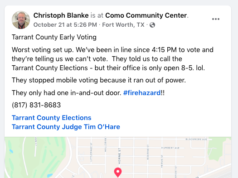“We will not be cowed by these sick terrorists,” said British Prime Minister David Cameron after ISIS produced a grisly video of the mass beheading of Syrian captives by jihadis.
“We will not be intimidated,” said Canadian Prime Minister Stephen Harper after the recent attacks in Montreal and Ottawa.
You hear this sort of rhetoric from Western leaders all the time, but Harper went on to demonstrate exactly how they get it wrong. “[This] will lead us to … redouble our efforts to work with our allies … against the terrorist organizations who brutalize those in other countries with the hope of bringing their savagery to our shores,” he said. Sound familiar?
Sure enough, there are now half a dozen Canadian planes bombing ISIS jihadis in Iraq (although it’s unlikely that either of the Canadian attackers, both converts to radical Islam, had any contact with foreign terrorist groups).
Here’s why Harper’s logic is completely backward: The purpose of major terrorist activities directed at the West, from the 9/11 attacks to ISIS videos, is not to intimidate. It is to get Western nations to bomb Muslim countries or, better yet, invade them. The terrorists want to come to power in Muslim countries, not in Canada or the United States. And the best way to establish your revolutionary credentials is to get the West to attack you.
That’s what Osama bin Laden wanted in 2001. He got not only the U.S. invasion of Afghanistan but another in Iraq. The ISIS videos of Western hostages being beheaded are also working: Provoke the West, build local support.
The Global Terrorism Index, published annually by the Institute for Economics and Peace, reported last week that fatalities due to terrorism have risen fivefold in the 13 years since the 9/11 attacks, despite the U.S.-led “war on terror” that has spent $4.4 trillion on the conflicts in Iraq and Afghanistan and anti-terrorist operations elsewhere. But the fatalities aren’t really despite those wars. They’re largely because of them.
The invasions; the drone strikes in Pakistan, Yemen, and Africa; the whole lumbering apparatus of the fight against terrorism have not killed the terrorist beast. They have fed it: 3,361 people were killed by terrorism in 2000; 17,958 were killed by it last year.
At least 80 percent of these people were Muslims, like the vast majority of the killers: the terrorists of Islamic State (ISIS) in Iraq and Syria, Boko Haram in Nigeria, the Taliban in Afghanistan and Pakistan, and al Qaeda and its offspring.
Terrorism isn’t a particularly Muslim technique. Its roots lie in European struggles against oppressive regimes in the late 19th and early 20th centuries. It gained huge currency in liberation struggles against the European colonial empires after the Second World War. The Irish Republican Army can be seen as part of this wave.
Later waves included the European, Latin American, and Japanese “urban terrorist” movements of the 1970s and 80s, like the Baader-Meinhof Gang in Germany, none of which had any political success. Specifically “Islamic” terrorism begins in the 1990s, with the rise of radical, anachronistic forms of Sunni Islam.
Only about 5 percent of the victims of this latest round of terrorism lived in developed countries, but their deaths and their governments’ responses fueled the spectacular growth of jihadi extremism. So what can be done about it?
The Global Terrorism Index points out that many terrorist organizations have gone out of business in the past 45 years. Only 10 percent actually won, took power, and disbanded their terrorist wings. Only 7 percent were eliminated by the direct application of military force.
And 80 percent were ended by a combination of better policing and the creation of a political process to address the grievances of those who supported the terrorism. You don’t fix the problem by fighting poverty or raising educational levels. You have to deal with the particular grievances that obsess specific ethnic, religious, or political groups.
And above all, keep foreigners out of the process. Their interventions always make matters worse. Which is why the terrorists love them so much.
Gwynne Dyer is an independent journalist whose work appears in 45 countries.













The two enemies of the people are criminals and government, so let us tie the second down with the chains of the Constitution so the second will not become the legalized version of the first. – Thomas Jefferson
Good reply Chris, and well said Mr. Jefferson, only it’s too late to achieve President Jefferson’s idea. The second are the terrorists and most americans naively believe mainstream media and their leaders. If you tell a lie long enough, people will believe it. That is partly how Hitler’s takeover grew as far as it did. That being said, most americans believe “we are the good guys” and granted there are some good people out there but as a generality the cold hard truth is we are really the bad guys pretending to be the “good” guys. Maybe one day we will stop talking about being the “good” guys and actually be it (like we once were).